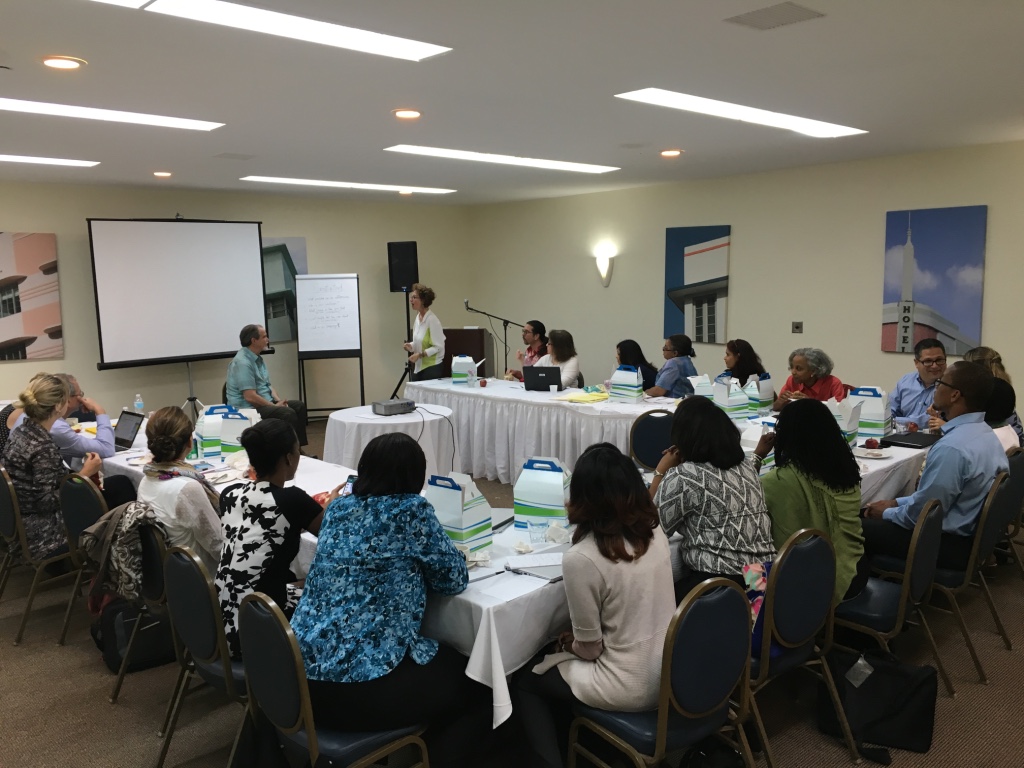- March 12th, 2016
- /
- NCD Stories
- /
- 0 Comments
- /
- Saltsmart: Towards a Caribbean Social Marketing Campaign

Most people know that consuming a lot of salt is bad for our health. Yet most of us still eat far too much of it, around twice the recommended daily amount. So how do those in the business of social marketing square this circle and get people to cut down on salt, turning awareness into action?
This was the central question confronting a group of multi-disciplinary experts brought together by the Pan American Health Organization (PAHO) in Miami, Florida on March 1-4. Communications specialists, nutritionists, representatives of health-based civil society organisations and several executives from giant food companies joined forces to try to build an effective salt-reduction campaign. The Caribbean contingent was drawn from Barbados, Jamaica and Suriname.
The workshop brief was fairly straightforward. Create a simple, attractive, targeted intervention that focusses on a key demographic: mothers with young children. A fun, easy and popular ‘ask’ should encourage them to add less salt to the food they cook or buy and give them the tools to effect this critical shift in behaviour. After a series of lively sessions three imaginative ideas emerged from the work groups, with a variety of taglines such as ‘Put salt in its place’ and ‘Taste life: Be saltsmart’.
Bill Smith, the event facilitator was impressed with the nascent campaigns. “We’ve had a number of really creative ideas. People have been stuck thinking that salt habits are difficult to change but our groups have come up with three very exciting ways to begin to attack that problem. It’s not going to be a quick solution but this is going to be a fun way for families to begin to think about salt.”
Next steps will involve honing the ideas, maintaining momentum – and finding funders for any potential campaign. According to Fiona Fennell, Public Relations and Communications Manager at the Ministry of Health, Jamaica, “The challenge now will be for us to take these ideas back to our respective countries and see how best we can begin to develop and implement some of what we’ve come up with. I think we can do it but there are a number of other competing health priorities and crises uppermost in funders’ minds.”
Brian Payne, a Community Nutrition Officer with the Ministry of Health in Barbados, agreed that funding was a “critical issue”, adding, “It’s a matter of organising our resources, both human and financial, to be a spearhead and tackle these problems head on.”
The results of the event were clearly a source of optimism in the face of the grave threat posed by excessive salt consumption. Dr Ruben Grajeda, a key member of the PAHO team noted, ‘We will have succeeded if this group continues to work together, if we can build a network to produce a variety of actions and interventions to reduce the amount of salt we eat.”
The Miami workshop was a key milestone in the Salt Smart Consortium’s project: Social Marketing Training and Technical Assistance to Reduce Daily Salt Intake. This Consortium promotes salt reduction in the context of a healthy and varied diet. It supports the PAHO-recommended target of less than 5 grammes of salt per adult per day by 2020. That’s about a teaspoonful. Currently, most people consume 9–12 grammes a day on average.
For more details on the project see the Healthy Caribbean Coalition powerpoint presentation from the PAHO WASH World Salt Awareness Week Webinar held on Monday February 29, 2016.
See more photos from the meeting here.



